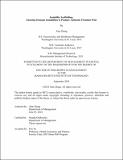Instability Scaffolding: Enacting Strategic Instabilities to Produce Authentic Premium Wine
Author(s)
Zhang, Alan
DownloadThesis PDF (5.207Mb)
Advisor
Orlikowski, Wanda
Terms of use
Metadata
Show full item recordAbstract
Unstable conditions can be a risk to productions, potentially disrupting operations and rendering activities unpredictable. While a common organizational response is to minimize instability, I find instead that producers can also purposefully cultivate it to generate value—through strategic instabilities. My dissertation explores how strategic instabilities are enacted in productions of fine wine, articulating the practices and arrangements that facilitate working with unstable production conditions in productive ways—a process I refer to as instability scaffolding. My data are drawn from a 16-month ethnographic study of two field sites in the California premium wine industry, combined with archival data and industry interviews. In Chapter One, I explain why minimizing certain sources of instability, while potentially more efficient, would be considered inauthentic for premium wine productions. In Chapter Two, I look historically at the California premium wine category, and explain why and how working with instabilities of nature became a basis of its authenticity. This chapter examines the instability scaffolding (i.e., cooperative category framing work) performed in the California wine industry to enable such productions to become commercially viable, and identifies the intra-category mutualism that motivated competitors to support such productions. Chapter Three offers insight into the modern-day operations of a world-renowned fine wine producer. I identify the trajectory management work scaffolding this organization’s achievement of craft authenticity, turning production instability into productive instability so that high-quality wines are produced consistently year after year despite relying on unpredictable activities. Chapter Four explores a regional-level instability scaffolding allowing many producers to keep their operations logistically feasible despite working with unstable conditions. I show how vineyard proprietors and contract providers worked together to sustain craft authenticity at scale in the region through a process I theorize as contract custodianship. My dissertation concludes in Chapter Five with a discussion of instability scaffolding more broadly and its implications for further research. I highlight how my research contributes new insights into the multiple ways organizations can leverage complex interactions in product by skillfully engaging with them to express authenticity in productions at commercial scale.
Date issued
2024-09Department
Sloan School of ManagementPublisher
Massachusetts Institute of Technology